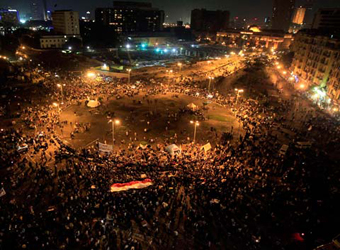Egyptian demonstrators clashed with police for a second day yesterday after President Mohamed Morsi’s decree extending his powers touched off one of the biggest nationwide protests since the fall of Hosni Mubarak.
Police used tear gas to disperse crowds in Tahrir Square, where tens of thousands gathered the day before with some of the demonstrators remaining overnight. Al Arabiya television said Morsi supporters attempted to storm the headquarters of the judiciary in Cairo and clashed with opposition protesters there.
Morsi issued a decree on Nov. 22 that prevents his decisions from being challenged by the judiciary. He also fired the country’s top prosecutor and ordered a retrial for Mubarak- era officials accused of causing the deaths of protesters last year. The step came a day after he earned international plaudits by brokering a cease-fire between Israel and Hamas.
The decree was an “unprecedented attack” on the independence of the judiciary, Egypt’s Supreme Judicial Council said in a statement after an emergency meeting, the official Middle East News Agency reported yesterday. Egypt’s judges have decided to suspend work in all courts across the country, MENA reported.
“The protests are likely to continue because the judges are respected more deeply than Morsi,” Joshua Muravchik, a fellow at the Johns Hopkins University’s School of Advanced International Studies, said by telephone yesterday. “He’s put himself in a very difficult situation.”
Morsi’s Power
Egyptian democracy advocate and opposition leader Mohammed El Baradei, former head of the United Nations nuclear watchdog agency, said no discussions are possible with Morsi, an Islamist who already has executive and legislative control, unless he rescinds the decree, the Associated Press reported yesterday.
At least 260 Egyptians have been injured in protests around the country since the decree was issued, MENA reported, citing health officials.
The Muslim Brotherhood, which backed Morsi for the presidency, and the main opposition groups have announced separate rallies on Nov. 27 for and against the presidential decrees, Arabiya said.
Speaking to supporters in Cairo Nov. 23, Morsi said his actions were necessary to prevent elements of the old regime from derailing Egypt’s revolution. Protesters accused him of seeking to replicate Mubarak’s dictatorial powers.
U.S. ‘Concerns’
Morsi’s decisions “raise concerns for many Egyptians and for the international community,” U.S. State Department spokeswoman Victoria Nuland said Nov. 23. “One of the aspirations of the revolution was to ensure that power would not be overly concentrated in the hands of any one person or institution.”
Financial aid from the U.S., and U.S. support for Egypt’s efforts to get loans from the International Monetary Fund and other organizations, is contingent on democratic development. Egypt reached preliminary agreement with the IMF on Nov. 20 for a $4.8 billion loan.
“His hope is that the West needs him more than he needs the West,” Aaron David Miller, a vice president at the Woodrow Wilson International Center for Scholars, a Washington policy group, said yesterday.
Financial support is crucial because Morsi is struggling to revive an economy battered by last year’s uprising, which caused tourists and investors to flee. Egypt’s benchmark stock index fell 3.9 percent this week, the biggest decline since June.
Egypt needs $10 billion of international financing in the fiscal year ending in June and $4.5 billion the following year, Ashraf el-Arabi, the minister of planning and international cooperation, told reporters in Cairo yesterday. The budget deficit may balloon to 13 percent of economic output if the government’s reform program isn’t implemented, he said.
“This cannot be good for Egypt,” said Abdulwahab Alkebsi, regional director for Africa and the Middle East at the Washington-based Center for International Private Enterprise. “With the legal system in shambles and the economy sputtering, post-revolution Egypt is losing investors and wasting valuable time needed to generate jobs for its youth.”
Bloomberg


